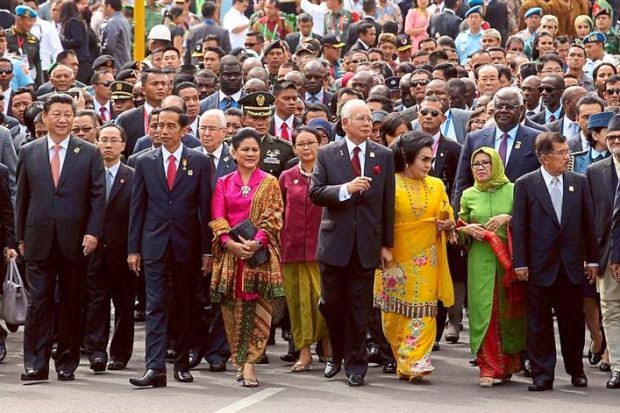 Red letter day: (From left) Hagiwara, Lim and Toray Battery Separator Film Co Ltd president O. Inoue checking out Penfibre products used in electronic tools during the opening of the division.
Red letter day: (From left) Hagiwara, Lim and Toray Battery Separator Film Co Ltd president O. Inoue checking out Penfibre products used in electronic tools during the opening of the division.Penfibre Sdn Bhd managing director K. Kurokawa said the company obtained its International Procurement Centre licence last year to process and market BSF in Penang.
“Located at our sister company’s premises Penfabric in the Bayan Lepas Free Industrial Zone, the RM15mil BSF project was smoothly completed last year despite extensive renovation work.
“Commercial production started early this year,” he said in his speech during the opening of the BSF division at the Equatorial Hotel recently.
He added that the division was capable of producing a high value-added BSF trademark under the name of Setela for supply to regional buyers for use in lithium batteries.
Toray Industries Inc senior vice president S. Hagiwara said Toray was a leading global supplier of polyester film, commanding a combined global market share of about 20%.
Toray produces and sells many types of films under the trademark ‘Lumirror’. They are used in a wide range of applications.
“To date, we have established sound manufacturing and delivery systems at six major bases worldwide in Japan, the United States, France, Korea, China and Malaysia,” said Hagiwara.
Chief Minister Lim Guan Eng said Toray was now one of the single largest investors in Penang and Malaysia.
“Thank you to Toray for providing thousands of job opportunities for Malaysians over the last four decades,” he said.
He said Penang’s approved manufacturing investments increased to RM8.2bil last year, which is a 109% increase from RM3.9bil in 2013.
“This made Penang the state with the highest investment after Johor and Sarawak,” he said.
He added that total investments in Penang increased to RM48.2bil from 2008 to 2014.
Lim also commended Toray Group (Malaysia) for their contributions via several corporate social responsibility programmes.
These included providing the RM6mil electronic scoreboard at Batu Kawan Stadium in 1999 and setting up the Malaysia Toray Science Foundation in 1993 and the Toray USM Knowledge Transfer Centre with a donation of RM4mil.
Toray also contributed RM300,000 towards the Tech-Dome Penang project recently.- The Starmetro
THE OPENING OF PENFIBRE BATTERY SEPARATOR FILM (BSF) DIVISION
SPEECH BY YAB TUAN LIM GUAN ENG THE RIGHT HONORABLE CHIEF MINISTER OF PENANG AT THE LUNCHEON HELD IN CONJUNCTION WITH THE OPENING OF PENFIBRE BATTERY SEPARATOR FILM (BSF) DIVISION ON 23RD APRIL 2015 AT HOTEL EQUATORIAL, PENANG
Good afternoon.
It is indeed a great pleasure for me to attend this luncheon, held in conjunction with the official opening of the Battery Separator Film Division at Penfibre this morning.
On behalf of the government and people of Penang, I would like to extend our heartiest congratulations to Toray for another milestone in your business expansion, particularly in the State of Penang.
Ladies and Gentlemen,
From a humble beginning where Toray Industries Inc., Japan first invested in Penang in 1973, we are proud to see that TORAY Group (Malaysia) has grown and expanded tremendously over the last 40 over years. With approximately RM4.5 billion investment to date and annual sales revenue of over RM4.1 billion from Penfibre, Penfabric, Toray Plastics (Malaysia) and Toray BASF PBT Resin, Toray is now one of the single largest investors in Penang and Malaysia. Thank you to Toray for providing thousands of job opportunities to our Malaysians over the last 4 decades.
Penang’s approved manufacturing investments increased to RM 8.2 billion in year 2014 compared to RM 3.9 billion in year 2013, a significant 109% increased. This made Penang the top 3 State with the highest investment, after Johor and Sarawak. Total investments in Penang has increased 93.6% to RM48.2 billion for the seven years period of 2008 to 2014, compared to the previous seven years period of 2001 to 2007 which was only RM24.9 billion. The jobs created has also increased 20.1% to 109,592 compared to 91,252 for the same period.
Going forward, it is important for Penang to stress on establishing Penang as a centre of science and technology through the Tech-Dome Penang project. Supported by our strong commitment to the Penang Government’s CAT policy, which stresses on “Competency”, “Accountability” and “Transparency”, it is our fervent hope that the bond and cooperation between all stakeholders will bring about a better tomorrow for every one of us.
I am happy to note that TORAY Group (Malaysia) has never failed in coming forward to support our nation building, through the various community projects under its Corporate Social Responsibility (CSR), namely:
• the RM2.5 Million Seberang Jaya Swimming Pool Complex in 1982,
• the establishment of the Malaysia Toray Science Foundation (MTSF) in 1993 to promote science and technology in Malaysia,
• the recent cash contribution of RM300 thousand towards the Tech-Dome Penang project.
In conclusion, I would like to once again congratulate Toray for having successfully established this new BSF Division in Penang. I am confident that Toray Group will enjoy even greater success in your future endeavors.
Thank you.

















